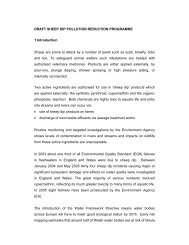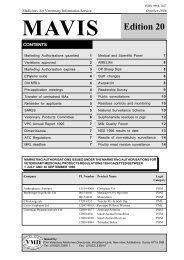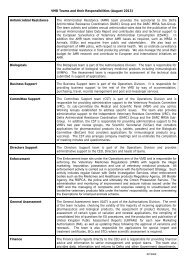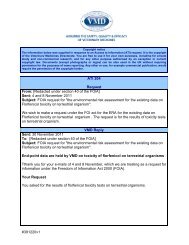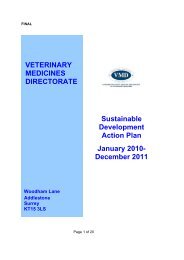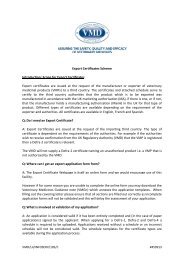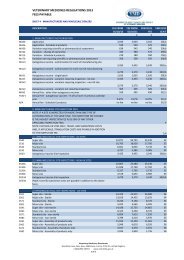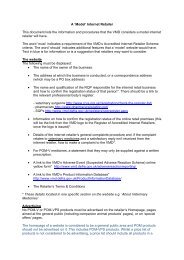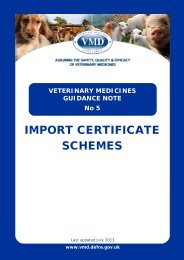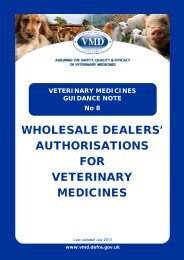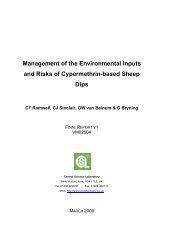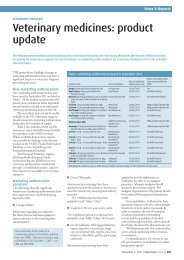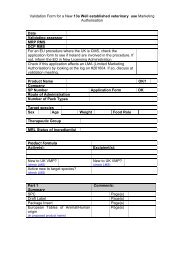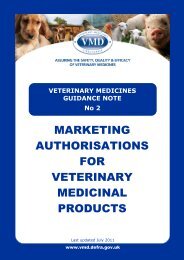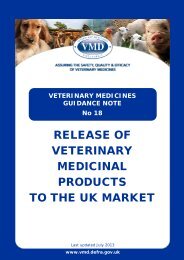VETERINARY MEDICINES GUIDANCE NOTE No 3
VETERINARY MEDICINES GUIDANCE NOTE No 3
VETERINARY MEDICINES GUIDANCE NOTE No 3
You also want an ePaper? Increase the reach of your titles
YUMPU automatically turns print PDFs into web optimized ePapers that Google loves.
VMGN <strong>No</strong> 3<br />
Inspections of <strong>No</strong>n-PSS practice premises will be conducted at least once every four<br />
years. Inspection of SQP retailer‟s premises are carried out on a risk basis and the<br />
frequency varies from once every four to six years.<br />
Veterinary practices which already belong to the Royal College of Veterinary Surgeons<br />
(RCVS) Practice Standard Scheme (PSS) are not subject to additional inspection by the<br />
VMD. The PSS medicines inspections cover the VMR inspection criteria (see Annex B)<br />
and additional criteria specific to the requirements of the PSS.<br />
Pharmacy premises are inspected by the General Pharmaceutical Council (GPhC).<br />
Prescriptions<br />
Prescribing is considered to be the action of deciding, instructing and recording which<br />
treatment should be administered to an animal and may be oral or put in writing. A written<br />
prescription is required when the product is to be supplied by a person working from a<br />
different business, or premises, from where the product was initially prescribed.<br />
Labelling at the time of retail supply<br />
The label information on the product is specifically authorised to provide necessary<br />
information for the safe and effective use of the product, this includes warnings for the user<br />
and animal owner, so it must not be obscured by any additional labelling or amendments<br />
made to the packaging.<br />
Retail supply via the internet<br />
Retailers of veterinary medicines may choose to operate their business via the Internet or<br />
mail order. The requirements of UK legislation apply, irrespective of whether a customer<br />
physically visits the premises and meets the RQP face-to-face or not. Each RQP must be<br />
able to demonstrate that they operate in accordance with the VMR including the<br />
registration and inspection requirements in respect of premises.<br />
Importation and exportation of veterinary medicinal products<br />
It is an offence to import a VMP not authorised for use in the UK and to supply such a<br />
VMP, unless it is supplied under the prescription of a veterinary surgeon and with a<br />
suitable import certificate issued by the VMD.<br />
The VMR do not restrict the export of veterinary medicines. If the export is within the<br />
European Union (EU) the Responsible person exporting the medicine must ensure that the<br />
product can legally be sold or supplied in the importing Member State. If the product is to<br />
be exported outside of the EU the VMD recommends checking the requirements for import<br />
in the country concerned.<br />
Supply of sheep dip<br />
If the VMP is a sheep dip, of any type, the supply must be to a person (or a person acting<br />
on his behalf) who holds a Certificate of Competence in the Safe Use of Sheep Dips<br />
showing that Parts 1 and 2 or units 1 and 2 of the assessment referred to in the Certificate<br />
have been satisfactorily completed, or NPTC Level 2 Award in the Safe Use of Sheep Dip<br />
(QCF).<br />
3



